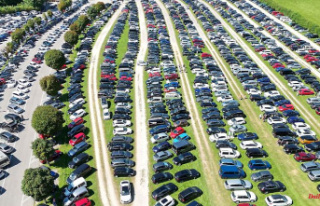Those who cannot pay a fine often end up behind bars. If you don't want that, you can do charitable work. The offer is less and less accepted, also because of the prosperity.
Munich (dpa/lby) - Almost 600,000 days of imprisonment have been avoided in Bavaria in the past ten years thanks to special work programs for convicted criminals. As a result of the "Sweat instead of sitting" and "Sweat instead of sit and money management" projects, 594,400 days since 2012 have not been put in behind bars, the Minister of Justice said at the request of the German Press Agency in Munich. This corresponds to the equivalent of more than 1628 years in prison.
However, a closer look at the days of imprisonment avoided per year shows that the trend has been declining for years. In 2013, for example, 71,500 and 2014 70,700 days of imprisonment were converted into community service, in 2020 it was only 41,000 and in 2021 46,000 respectively.
"Anyone who does not pay a fine is threatened with imprisonment in Germany. We want to avoid imprisonment as much as possible. Because the person concerned was sentenced to a fine and not to imprisonment," Justice Minister Georg Eisenreich (CSU) describes the philosophy behind the detention avoidance. And by the way, the state treasury is also relieved, since looking after and feeding prisoners costs money.
The job opportunities are diverse - be it in workshops, where those affected do painting or varnishing work, in carpentry shops, locksmith shops or in gardening and landscaping.
According to the ministry, the decline in the number of days in prison avoided since 2017 can be attributed to various factors. The working group of the Bavarian specialist agencies for the avoidance of detention (AGV), for example, reports that the good economic development up to the outbreak of the corona pandemic contributed to the fact that more convicts were willing (and able) to pay the fines imposed.
At the same time, according to the AGV, the proportion of "difficult clients" who showed no serious interest in avoiding detention and of test subjects who were addicted or mentally ill and who were difficult to place had increased, according to a ministry spokesman. Comparable difficulties in placing convicts and a corresponding decline in the number of placements are also known from other federal states.
With a view to the low value in 2020, the ministry also emphasized that this was a special effect due to the corona pandemic. In August 2020, the enforcement authorities were asked to expressly and, if necessary, repeatedly offer the convicts the granting of payment facilities in suitable cases. In addition, some of the deployment sites were not available due to the pandemic, for example because of the contact restrictions in old people’s and nursing homes.
For more than 30 years, the Bavarian judiciary has given those convicted of unaffordable fines the opportunity to avoid prison by doing community service. In 2005, the "Sweating instead of sitting" project was launched and has since been expanded. Since September 2022, there has also been a pilot project at the Munich I public prosecutor's office, where the court assistant makes personal contact with the convict if imprisonment is imminent in order to advise on repayment options and, if they are unable to pay, to put them in touch with the mediation centers for the prison avoidance programs.












